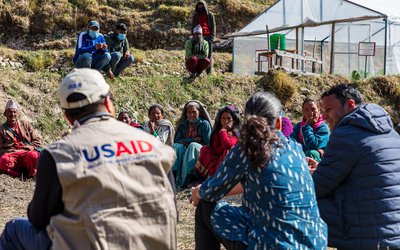As Nepalese farmers face an assault by destructive pests on their tomato farm, Muni Muniappan, director of the Feed the Future Innovation Lab for Integrated Pest Management (IPM Innovation Lab), is working to rescue them.
In the midst of a growing threat, IPM Innovative Lab, which is funded by the United States Agency for International Development (USAID) and managed by Virginia Tech, an American university, is working with Nepalese scientific and academic institutions to deal with the problem.
In January, the innovation lab held a symposium on Tuta absoluta, the tomato killer, as part of the International Conference on Biodiversity, Climate Change Assessment and Impacts on Livelihood in Kathmandu. Agricultural administrators, scientists, extension agents, NGOs, and the public were informed at the symposium about the danger from this pest.
Tuta absoluta, known as the South American tomato leafminer, is a moth native to South America, but it crossed borders from Chile to Spain in 2006. It then spread through Europe and the Mediterranean and came into Central and South Asia, as it went into parts of Africa. It was confirmed to have arrived in India in 2014. In the spring of 2016, the pest had already made its inroads into Nepal. So far it has been found in Kathmandu, its surrounding districts, like Lalitpur ,Bhaktapur, and Kaski , Surkhet in the west. However, it may also have spread to other parts of the country.
Left unchecked, Tuta absoluta can destroy the country’s entire tomato crop. In 2016, it destroyed 80% of Nigeria’s tomatoes, an event which, newspapers called, was a “tomato emergency.” And while the pest prefers tomatoes, it will also attack brinjal, potato, and pepper. In Nepal, the potential losses due to this pest could reach $50 million per annum.
“There is no magic cure for Tuta absoluta,” says Muni Muniappan, director of the lab. “We cannot stop it, but we can slow down its devastation.”
In order to help countries deal with the pest, Muniappan and the IPM Innovation Lab have held 16 international awareness workshops about Tuta absoluta around the world, involving scientists from 55 countries.
Dr. Muniappan currently serves as the director of the IPM Innovation Lab. This is a position he has held since 2006. As a world-renowned specialist in tropical economic entomology, biological control of insect pests and weeds, and integrated pest management, Muniappan has devoted his life’s work to improving conditions for farmers in the developing world. He has made considerable contributions in the development of crop-specific IPM techniques, fostering partnerships with private sector organizations, encouraging scaling up through the dissemination of information, and promoting partnerships as a means of capacity building.
Muniappan has also served in management positions for international scientific bodies and conducted international workshops in Africa, Asia, Europe, and Australia. Muniappan has published several research and popular articles and co-written and edited three textbooks
While managing the IPM Innovation Lab, Muniappan has made time to mentor dozens of young scientists in developing countries, and to continue his own research—making discoveries about invasive pests and publishing his findings. This research has made him a well-regarded scientist of international stature, called on by governments around the world and international agencies to consult on invasive pests.
Before the pest reached Nepal, the IPM Innovation Lab predicted it would arrive eventually and held an awareness workshop in the country in 2015. It also invited Nepalese scientists to a similar workshop in Ethiopia in 2013. This gave Nepal the opportunity to prepare by setting up pheromone and light traps in order to monitor for the pest’s arrival, so that when it did enter the country, scientists and farmers were ready.
During the January symposium, scientists from Nepal and around the world presented papers and shared their experiences of the deadly pest, which had already affected some tomato farmers.
The Tuta absoluta moth is very small, measuring only 0.5 centimeters long, and it multiplies quickly, depending on the climate. In a tropical climate, it will complete its entire lifecycle in about three weeks, whereas it will take longer in colder climates.
It lays individual eggs, mostly on the lower surface of tomato leaves. The caterpillar bores into the leaf and feeds on the inner contents of the leaf by mining. Some caterpillars may move to the fruits and feed on them. The fully-grown caterpillars come out of the leaf mines and fruits, drop to the ground, and pupate in the soil. Tuta absoluta is active at night and hides under leaves and debris during the daytime.
In order to prevent a total loss of tomatoes in Nepal, the IPM Innovation Lab is working with Nepalese government organizations in adopting various environmentally safe technologies, such as use of pheromone traps, bio-pesticides, botanical pesticides and safe insecticides.
“With proactive actions,” Muniappan says, “we hope to significantly reduce the economic loss caused by this pest in Nepal and around the world.”
In Nepal, agriculture is the backbone of initiatives for sustainable economic growth, poverty alleviation, and food security. The invasive tomato pest poses to threaten this very backbone, starting with the widely cultivated tomato crop.
“At IPM Lab through USAID support, we are working with collaborative approaches to contain or control the deadly pest. During the international symposium in January, scientists presented different papers and shared experiences about what can be done regarding the risk,” said Prof. Dr. P.K. Jha, chairman of the International Conference Organizing Committee. One of the resolutions of the conference was to form a national task force to manage Tuta invasion in Nepal.There is a need for development and implementation of integrated pest management in the hilly regions of Nepal,Bhutan,India and Pakistan. These regions share a unique environment and need to be protected and developed.
The work of IPM, under USAID support, should give some relief to the farmers of Nepal.In the first week of February, a team of experts from Virginia tech-USA visited Tuta infested tomato field in Surkhet with Dr Luke Colavita (IDE),Dr Dilli Ram Sharma(Department of Plant Protection -GoN), Dr B N Mahato (NARC) and Prof P K Jha.

Keshab Poudel
Poudel is the editor of New Spotlight Magazine.
- US SUSPESION OF GRANT: Impact On Nepal
- Mar 10, 2025
- Helvetas Nepal has been instrumental in Nepal's development.: Dr. David Seddon
- Mar 08, 2025
- PM OLI’S MOVE TO REMOVE MD GHISING: Sparking Political Clash
- Mar 07, 2025
- Nepal and India: More Cross Border Transmission line
- Feb 12, 2025
- MAHAKUMBH 2025 Festival Of The Century
- Feb 10, 2025















